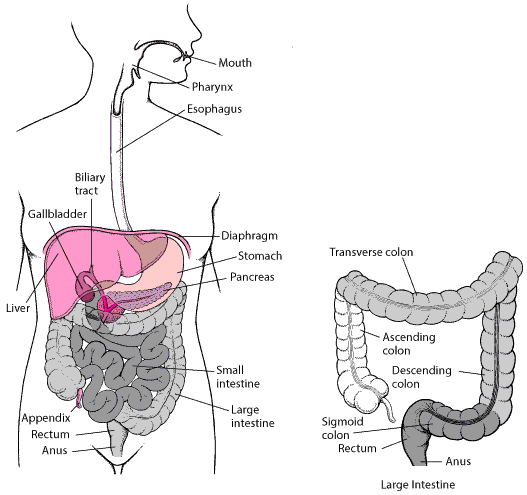An anorectal fistula is an abnormal
channel that leads from the anus or rectum usually to the skin near the anus
but occasionally to another organ, such as the vagina.
-
- Anorectal fistulas are common among people who have an anorectal abscess, Crohn disease, or tuberculosis.
- Anorectal fistulas can cause pain and produce pus.
- The diagnosis is based on an examination and other viewing techniques.
- Treatment nearly always involves surgery, but some less invasive alternatives now exist.
The rectum is the section of the digestive tract above the anus where stool is held before it passes out of the body through the anus. The anus is the opening at the end of the digestive tract where stool leaves the body.
The Digestive System

Most fistulas begin in a deep gland in the wall of the anus or rectum. Sometimes fistulas occur after drainage of an anorectal abscess, but often the cause cannot be identified. Fistulas are more common among people with Crohn disease or tuberculosis. They also occur in people with tumors, diverticulitis, cancer, or an anal or rectal injury. A fistula in an infant is usually a birth defect and is more common among boys than girls.
Fistulas that connect the rectum and vagina (called rectovaginal fistulas) may result from radiation therapy, cancer, Crohn disease, or an injury to a mother during childbirth.
Symptoms
An infected fistula may be painful and may discharge bloody pus.
Diagnosis
-
- A doctor's evaluation
- Sigmoidoscopy
A doctor can usually see one or more openings of a fistula or can feel the fistula beneath the surface. A probe may be inserted to determine its depth and direction. By looking through an anoscope (a short, rigid tube) inserted into the rectum and exploring with the probe, a doctor may locate the internal opening. Inspection with a sigmoidoscope (see Endoscopy), which is a much longer viewing scope, helps a doctor determine whether the problem is being caused by cancer, Crohn disease, or another disorder.
Treatment
-
- Surgical procedures
- For fistulas caused by Crohn disease, drugs
Previously, the only effective treatment was surgery to open the fistula (fistulotomy). During surgery, sometimes the sphincter is partially cut. If too much of the sphincter is cut, the person may have difficulty controlling bowel movements. Newer surgical procedures use advancement flaps (flaps are stretched over the opening of the fistula) or other procedures to close the internal opening of the fistula. Biologic plugs and fibrin glue instillations are alternatives to fistulotomy.
If the person has diarrhea or Crohn disease, which may delay wound healing, surgery usually is not done. Drugs used to treat Crohn disease can help a fistula close.


